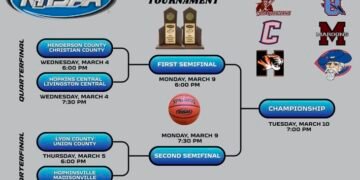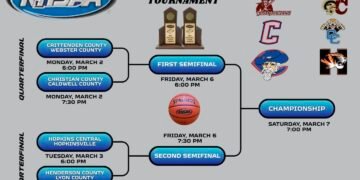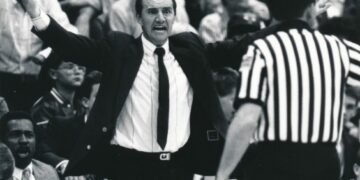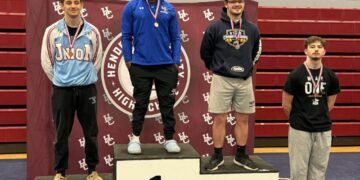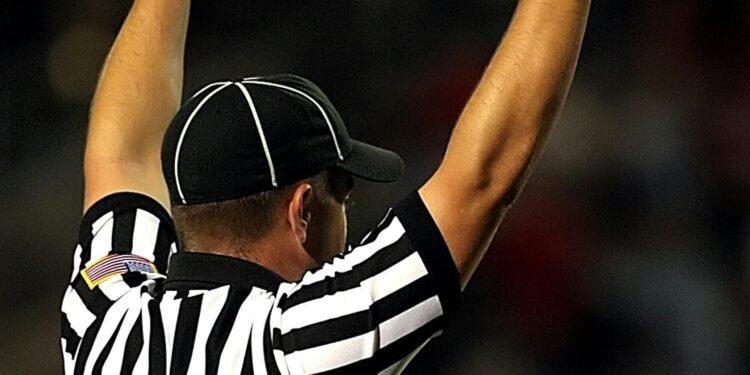In October, an assistant coach for the North Middle School football team smacked a referee in the back of the head after the Cadets played a game against South Middle School. The coach was eventually charged with harassment (physical contact) no injury, a Class B misdemeanor that could result in up to 90 days in jail and a $250 fine, according to statute.
Another incident in Paducah several years ago involved a coach from Michigan, Keyon Menifield, and basketball referee Kenny Culp during an Amateur Athletic Union tournament. It’s one of the most harrowing that Keith Green, the assigning secretary for soccer in the second region and also a basketball referee, has ever heard about.
A McCracken County Sheriff’s Office report said after an argument with Menifield, Culp turned and walked away from the coach when he was attacked. The Associated Press reported that Culp was treated for a broken collarbone, a crack in his sinus cavity and a concussion.
Four years later, Green said Culp “still isn’t right because of some of the brain trauma that occurred from it.”
Henderson County Sheriff Chip Stauffer says he regularly stands outside the referee locker room after games he attends to provide some protection. He said he knows of a referee whose father attends competitions so that he can walk his son out to his car after games.
These local and regional examples highlight an environment surrounding youth sports that has gone from being competitive to, in some cases, breaking the law. Veteran referees say incidents like these occur too often and are the driving factor for the dwindling numbers of sports officials locally, regionally and nationally.
Another referee, Brad Phipps, the assigning secretary for football in the second region, said in his 18 years of refereeing he has dealt with uncomfortable situations, including being bumped, being followed to his car and being escorted to his car by the police.
“I have been talked to as a sub-class human being,” he said.
Of the referees who don’t call games anymore, “46% left because of the way they were treated,” Phipps said.
Green concurred, saying that many who still call games won’t work at specific schools because of the fans or the coaches there.
“We have officials that will not work because they don’t feel safe,” Green said.
In some regard, sports officials should expect some jawing from fans and coaches. That’s only natural, said Henderson County Schools Superintendent Bob Lawson, who years ago was an assistant coach for the Henderson County High School football team. He said he has yelled at officials during games—every coach has.
But when it becomes personal and/or continues after games, including threats and assaults, that’s unacceptable, Lawson said.
Because when that happens, the dwindling number of sports officials will continue to decrease, leaving youth sports administrators scrambling for ways to continue to hold contests.
“If we act and behave that way, we won’t have officials,” Lawson said.
That’s already happening. Phipps said he had to cancel two middle school football games in the region because he didn’t have enough officials and had to assign a crew of four, instead of the normal five, for one high school game.
And at the beginning of the fall soccer season, 12 high school games across the region were cancelled because there were not enough referees to officiate them, Green said. There were four more games canceled the rest of the season in the region, he said.
Seeing those cancellations was one reason Brian Crafton decided to start refereeing soccer games last fall. Crafton, a former HCHS soccer head coach who also played for the Colonels in the early 1990s, said he felt bad that the athletes would lose opportunities to compete.
During his first season as a ref, Crafton said he had a couple run-ins with coaches that weren’t comfortable. But he said he didn’t encounter as much animosity from parents as he thought he would, possibly because he did a good job or that he’d grown a thicker skin than some of the younger people who take on refereeing. Still, he understands why the younger generation may be turned off from refereeing.
“I can see where some younger people wouldn’t want to do it,” he said. “I really could.”
Age is another concerning point about the sports official shortage. This year, the National Association of Sports Officials surveyed officials from all over the country. Of the 35,813 who responded, the average age was 57. That shows that younger people aren’t interested in officiating sports, like they might have been in the past.
If new officials don’t replace them, “then we’ll be in real danger,” Lawson said.
Both Phipps and Green said the verbal abuse doesn’t affect them as much as the younger referees. They both agreed that younger people get turned off from pursuing sports officiating because they don’t want to deal with the animosity.
Green said younger people approached to become officials often say things like, “I’m not willing to put up with being screamed at and yelled at.”
Locally, athletic departments try to keep a close eye on crowd and coach behavior. Henderson County High School Athletic Director Mark Andrews said that parents must sign a code of conduct that is given to them when registering their child for athletics. Andrews forwarded a copy to the Hendersonian. Among the agreements on the code of conduct relating to sports officials are that parents will:
- ask their child to treat other players, coaches, fans, and officials with respect regardless of race, sex, creed or ability
- encourage good sportsmanship by demonstrating positive support for all players, opponents, coaches and officials at every game, practice or other sporting event
- support coaches and officials working with their child, in order to encourage a positive and enjoyable team experience for all.
Parents who violate an agreement first get a warning. After a second violation, they could get a two-game suspension. After a third, they are suspended from attending athletic events for the rest of the school year.
Andrews said during games, school staff keep watch of what’s occurring in the stands.
“As game managers, we attempt to prevent the officials from being confronted by someone during or after the game,” he wrote in an email to the Hendersonian. “Either school administration or security will escort the officials to their locker room or automobiles after a game. We try to keep an eye on how the fans are treating the officials during a game and address it as necessary. We will first communicate with angry fans to encourage them to treat the officials appropriately. However, in some circumstances, we have had to remove fans from the venue. While that is not something we like doing, we have an obligation to protect the officials and teach good sportsmanship to everyone.”
Andrews also reviews appropriate conduct for coaches before each season begins, he said.
Lawson said instances of unruly fans at games occurred more often right after the COVID-19 isolation ended. He said athletic and administration noticed it and took action to stop it. Since then, he said there are still isolated incidents but not to the same level as right after the pandemic.
Phipps said he’s seen unruly behavior increase during his time as a referee. Early in his officiating career, there were moments of bad behavior, but “nowadays it’s every game. It’s somebody every game.”
And he said the parents’ and coaches’ bad behavior is spreading to the student-athletes. One middle school athlete in a different county, he said, “literally charged the official.”
Green said a law requiring the home school to pay a fine if a fan gets tossed has had benefits in Tennessee. Phipps said that for the atmosphere to improve in youth sports in the region, people who engage in these antics must be held accountable.
This, to some degree, occurred with the North Middle School assistant coach, Frederick Flemmon. After the Oct. 21 game against South Middle School, Flemmon approached a referee, Sandy Burnette, and said he wanted to talk about the clock management and penalty flags, to which Burnette responded that he had no control over the clock and that the game was over, according to a Henderson Police Department incident report.
Burnette then turned and began walking away when “he was struck upside his head, knocking his cap off,” according to the report. Burnette picked up his cap and moved on to his vehicle, when Flemmon told him, “That’s right, walk to your car. You keep walking to your car,” said the report.
Flemmon was told he couldn’t coach any more after the incident, Lawson said. Flemmon is due in court in early January.
Athletics, and specifically high school athletics, have long been a part of the culture in Henderson County. Along with that comes a passionate fan base. But Lawson said that passion can never spill over into getting personal with sports officials.
“It can never be personal,” Lawson said. “At the very foundation of it, it can never be personal.”
In those moments when the passion for competition runs thick, Lawson reminds fans and coaches to remain “steady and respectful,” which will set an example for students on how to handle adversity.
Not to mention a hostile atmosphere might scare off would-be sports officials from ever blowing a whistle.
“If we don’t have them,” Lawson said, “then we won’t have the sport.”




